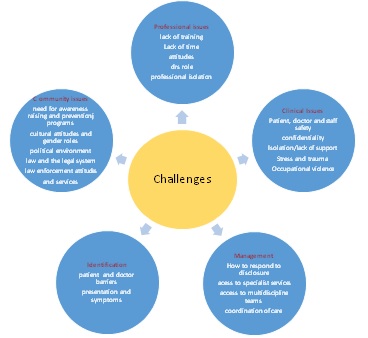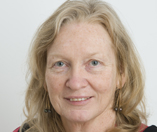Hidden violence: Working to meet the challenges facing family physicians and their patients.
Introduction
The
WONCA Working Party on Women and Family Medicine (WWPWFM) has, since its inception in 2001, identified family violence as a major health issue facing women doctors and their patients WONCA’s stance against family violence has been further strengthened by the Vasco da Gama Young Doctors group work and the formation of the
WONCA Special Interest Group on Family Violence (WONCA SIGFV) in 2014.
In 2013, at the WONCA World Meeting in Prague, the WWPWFM ran a workshop led by A/Professor Jan Coles from Australia on “Hidden Violence”. At this workshops participants addressed the challenges facing family physicians and then worked on solutions to the challenges they identified. To engage with doctors from more WONCA regions these workshops have been repeated in 2014 with WWPWFM members leading at the WONCA Asia-Pacific Meeting in Kuching, Malaysia (in collaboration with the WONCA SIGFV) and at Wonca Rural meeting in Gramado, Brazil.
Key themes from the Workshops

A number of key themes were identified at all workshops. The universal themes were: the need to improve training for doctors in recognising and responding to family violence, improved strategies within the community to prevent violence and to raise awareness of its health costs; and finally, the value of access to coordinated multidiscipline team response supported by community-based services such as refuges for women and specialist family violence services for women and men, victims and perpetrators. At the Malaysian conference gendered and cultural behaviours identified as a particular challenge in the Asia Pacific. In Brazil, specific challenges faced by rural family doctors included the lack of confidentiality and anonymity in small rural communities, being the doctor for victims and perpetrators, violence directed towards informers and sometimes the doctor, and the lack of support for the physicians.
Priority Areas for development
Workshop participants shared their ideas and strategies for responding to the challenges posed by responding to family violence in clinical practice. Solutions included developing local referral networks, working with other community based agencies and working as part of a multidiscipline team. In areas where few services were available, up skilling in trauma counselling by doctor and/or other health workers and the formation of self-help women’s groups may be innovative sources of support were services are limited.
Improved professional education was the theme that was raised in every workshop. Education was felt to be most effective if it started early with medical students and vertically integrated to progressively improve the doctors’ skills as they moved from novice to expert family physicians. Increasing curriculum content in this area of medicinal training was recommended.
What’s next?
It is planned to hold the workshop at regional meetings, including WONCA Africa in 2015. The findings from each of the workshops will be used to focus and prioritise future initiatives of the WWPWFM so that the needs of doctors working with, and responding to, patients who experience family violence are addressed. For the WWPWFM group, these include a planning half day training workshop for family physicians and a workshop on sharing and developing educational resources for participants to use in their context to be presented at Wonca regional meetings in 2015.
A number of collaborative initiatives are being developed for future WONCA conferences and for the sharing of resources by the WWPWFM, the Vasco da Gama and other young doctors groups and the WONCA SIGFV.

Jan Coles
To find out more about the SIG on Family Violence email Leo Pas convenor
SIGfamilyviolence@wonca.net